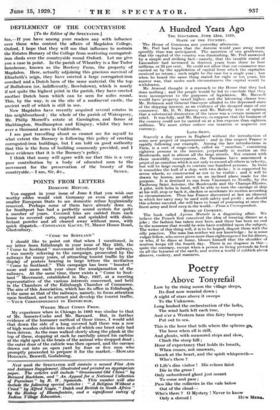POINTS FROM LETTERS DOMESTIC REFUSE.
You suggest in your issue of June 8 that you wish our worthy ediles would visit Germany or even some other smaller European State to see domestic refuse hygienically removed. Perhaps some of them have already done so, for Southport has had a perfectly sound system for quite a number of years. Covered bins are carried from each house to covered carts, emptied and sprinkled with disin- fectant powder and all cleared away without mess, with quick dispatch.—CONSTANCE Gamer, 77, Manor House Road, Glastonbury.
" COME TO SCOTLAND"
I should like to point out that when I mentioned, in my letter from Edinburgh in your issue of May 25th, the " Come to Scotland " movement introduced by the railways, I was merely referring to the campaign, prosecuted by the railways for many years, of attracting tourist traffic by the display of posters bearing in large letters the invitation " Come to Scotland." This campaign has been " boosted " more and more each year since the amalgamation of the railways. At the same time, there exists a ' Come to Scot- land " Movement, established in May, 1927, at a meeting representative of the various interests concerned, and held in the Chambers of the Edinburgh Chamber of Commerce. The aim of this Association, which has its office in Edinburgh, is the same as that of the railways, namely, to focus attention upon Scotland, and to attract and develop the tourist traffic. —YOUR CORRESPONDENT IN EDINBURGH.
WHERE MEAT COMES FROM.
My experience when in Chicago in 1888 was similar to that of Mr. Somers-Cocks and Mr. Barnard. But, in further evidence of the humaner method of those times, I would add that down the side of a long covered hall there was a row of high wooden cubicles into each of which one beast only had been driven. As the man walked slowly along the plank at the top of these, stopping at each he carefully aimed his carbine at the right spot in the brain of the animal who dropped dead ; the outer door of the cubicle was then opened, and the carcase drawn out into an open yard by four or live men who promptly proceeded to prepare it for the market.—Hownan HODGKIN, Benwell, Godalming.






































 Previous page
Previous page